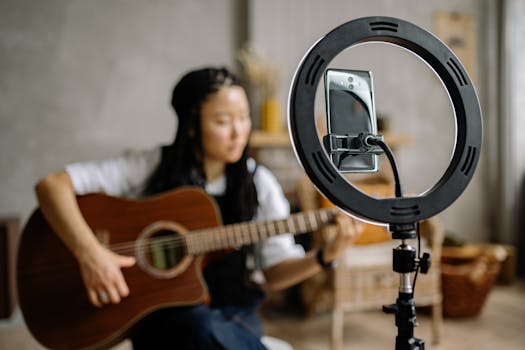As the digital landscape continues to evolve, so does the music community. Musicians, fans, and industry professionals are reshaping how they interact and share their passion for music.
Technology and social media have played crucial roles in fostering new connections. This transformation presents exciting opportunities for collaboration, discovery, and engagement among music enthusiasts.
Understanding the future of music communities involves exploring trends, challenges, and innovations. By examining these aspects, we can gain insights into how music will be experienced in the coming years.
The Rise of Online Platforms
Online platforms have drastically changed the landscape of music communities. Artists now have accessible tools to share their work with global audiences, breaking geographic barriers.
Platforms like SoundCloud, Bandcamp, and Spotify are instrumental in this shift. They allow musicians to upload their tracks, stream music, and engage with fans directly and effectively.
These platforms have also given rise to niche genres and underground movements. Artists can find their specific audiences, encouraging diversity and innovation in music styles.
Additionally, social media platforms enhance connectivity among musicians and fans. These spaces enable real-time conversations and facilitate collaborations that were previously difficult to achieve.
Overall, the increase in online platforms has fostered vibrant and engaged music communities, marking a significant step toward a more interconnected musical landscape.
Collaboration Over Competition
The future of music communities sees a shift toward collaboration rather than competition. Artists increasingly understand the value of working together to create unique experiences and sounds.
Collaborative projects often result in richer music. They blend influences from various genres, broadening the horizons for both artists and listeners alike.
Moreover, these collaborations span across various disciplines. Musicians may collaborate with visual artists and filmmakers, creating multi-dimensional projects that engage fans on different levels.
Fan involvement is also vital in these collaborations. Many artists encourage their communities to contribute ideas, feedback, and even their talents, making music a collective effort.
In essence, the focus on collaboration fosters a sense of belonging and shared purpose within the music community, emphasizing unity over rivalry.
The Impact of Virtual Reality
Virtual reality (VR) is poised to revolutionize music experiences in profound ways. As technology continues to advance, immersive music experiences will become more commonplace.
VR concerts offer fans a chance to experience performances from the comfort of their homes. This democratizes access to live music, breaking down traditional barriers to attendance.
Moreover, artists can create entirely new atmospheres and stories through VR technology. These unique concert experiences may include interactive elements, allowing fans to engage more deeply.
Additionally, VR fosters connections among fans who feel isolated. Virtual spaces enable discussions and interactions, creating a sense of community among attendees from various locations.
With advancements in VR, the music community can look forward to innovative experiences that transcend physical limitations and create lasting memories.
The Role of AI in Music Creation
Artificial intelligence (AI) is becoming increasingly influential in music creation. AI tools can assist musicians in composing, generating sounds, and even mastering tracks.
This technology opens up new creative avenues for artists. Musicians can experiment with different genres and styles, pushing the boundaries of traditional music composition.
Moreover, AI-driven platforms can help analyze music trends. This allows artists to tailor their work to audience preferences, resulting in a more resonant musical experience.
However, the rise of AI in music raises questions about originality and authenticity. Artists must navigate the balance between utilizing technology and maintaining their unique sound.
Despite these challenges, AI offers unparalleled opportunities to enhance creativity and engagement within the music community, setting a new precedent for artistic expression.
Building Inclusive Communities
In the future, music communities will likely prioritize inclusivity and diversity. As musicians embrace varied perspectives, a richer and more vibrant environment will emerge.
This inclusivity allows underrepresented voices to gain visibility in the music landscape. Music communities can be powerful catalysts for social change when diverse artists are amplified.
Community-led initiatives can also promote inclusive practices. Workshops, events, and festivals focused on various cultures and genres can reach wider audiences and enhance understanding.
Furthermore, online platforms play a significant role in fostering inclusive interactions. Musicians can share experiences, collaborate, and support each other, regardless of background or identity.
Ultimately, embracing inclusivity in music communities strengthens connections, enriches creativity, and cultivates a welcoming environment for all artists and fans.
The Evolution of Live Music Experiences
The future of music communities will redefine live music experiences. Emerging technologies will enhance how audiences connect with performances, transforming traditional concerts.
Hybrid events combining physical and online attendance have gained traction. This approach allows artists to reach larger audiences and offer more flexible options for fans.
Moreover, interactive elements within live performances can deepen audience engagement. Fans may participate in setlist selection or vote for encore songs, fostering a sense of ownership.
Live streaming concerts also democratize access, allowing fans unable to attend in person to experience performances in real-time. This inclusivity can significantly expand fanbases.
By prioritizing innovative and accessible live experiences, music communities will thrive and continue to evolve, bringing fans and artists closer together.
Acknowledging Mental Health in Music Communities
As awareness of mental health issues grows, music communities are increasingly focused on supporting mental well-being. Artists often confront unique challenges, making mental health a priority.
Community initiatives focused on mental health can provide essential resources. Workshops, counseling, and support groups may help musicians and fans navigate their challenges.
Additionally, artists openly discussing mental health can foster acceptance. Sharing experiences encourages fans to address their struggles and reduces the stigma surrounding mental health issues.
Moreover, music can be a therapeutic outlet for many. Understanding its power in promoting emotional expression emphasizes the benefits of community support.
As awareness of mental health in music communities expands, collaboration, empathy, and understanding will pave the way for healthier environments for all involved.
Conclusion
The future of music communities is bright, marked by innovation, collaboration, and inclusivity. Embracing technology and prioritizing mental health will create richer and more engaging experiences for fans and artists.
By recognizing the importance of diverse voices and fostering creative partnerships, these communities can evolve continuously. Together, they will build a vibrant future for music as a shared experience.
As we navigate this evolving landscape, staying connected and supportive will be essential. The passion for music can unite individuals and create memorable experiences beyond borders.
Ultimately, the future of music communities is about forging connections and celebrating the joy that music brings to our lives. These communities will continue to thrive as they embrace change and creativity.


